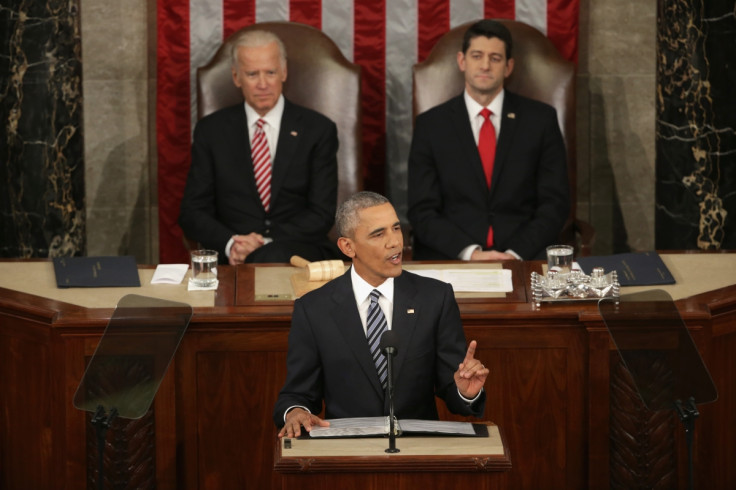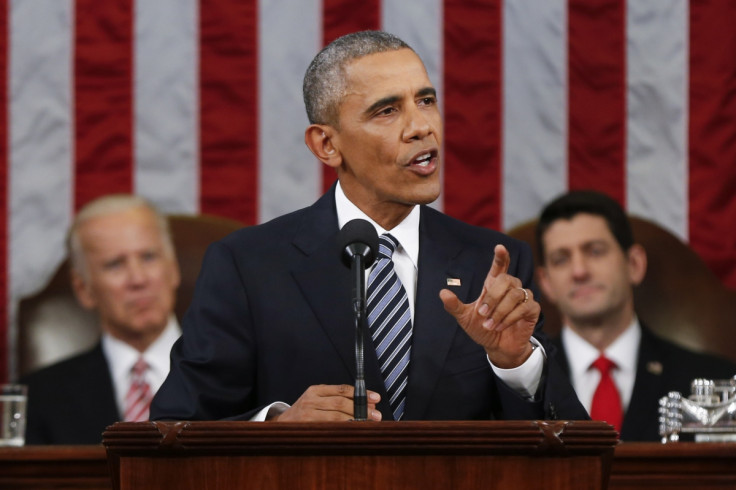State of the Union 2016: President Barack Obama's final address focuses on the future

US President Barack Obama gave his eighth and final State of the Union Address on 12 January, defending the achievements of his two-term presidency and striking an optimistic note for the future of the country.
Obama was introduced to Congress by Speaker of the House Paul Ryan after the traditional walk and welcome into the joint session.
I'm treating this last State of the Union just like my first - because I'm still just as hungry. I hope you tune in, because it's for you.
— President Obama (@POTUS) January 13, 2016As it is his final year, Obama vowed to go "easy" on listing the proposals for the year ahead.
"I'll keep pushing for progress on the work that still needs doing. Fixing a broken immigration system. Protecting our kids from gun violence. Equal pay for equal work, paid leave, raising the minimum wage. All these things still matter to hardworking families; they are still the right thing to do; and I will not let up until they get done."
Instead, the president called for a focus on the future five years and 10 years on. "We live in a time of extraordinary change—change that's reshaping the way we live, the way we work, our planet and our place in the world," Obama said.
He focused much of his address on four questions the country has to answer "regardless of who the next President is, or who controls the next Congress." First was the US economy and how to provide a fair shot at opportunity and security.
Obama claimed the US "has the strongest, most durable economy in the world." He noted the way technology has affected the American workforce and the shift to a more global economy.
The president then spoke on education and benefits, including his controversial Affordable Care Act. "Now, I'm guessing we won't agree on health care anytime soon. But there should be other ways both parties can improve economic security," he said.
Obama appeared opened to discussing with Speaker Ryan about tackling poverty, but added that the government should find a way to make sure the "system's not rigged in favour of the wealthiest and biggest corporations."

Next the president discussed making technology work for the country particularly in regards to climate change and saying that there should be a renewed effort to bring about scientific innovation in the US.
He mentioned Vice President Joe Biden's efforts to continue work towards a cure to cancer. Biden lost his son, Beau Biden, last year to brain cancer and eventually decided to forgo a run for the White House.
The president announced a new national effort to find a cure for cancer and placed Biden in charge. "For the loved ones we've all lost, for the family we can still save, let's make America the country that cures cancer once and for all," he said. "Medical research is critical. We need the same level of commitment when it comes to developing clean energy sources."
Obama's international vision
Obama also described how the US can lead the world without becoming the international policeman.
"The United States of America is the most powerful nation on Earth. Period. It's not even close. We spend more on our military than the next eight nations combined. Our troops are the finest fighting force in the history of the world," he said to raucous applause from members of both parties. "No nation dares to attack us or our allies because they know that's the path to ruin."
Obama noted the growing influence Beijing and Moscow have in the Middle East and beyond. He also noted that the top priority for the US is to protect the American people and to attack terrorist organisation—particularly al Qaeda and the Islamic State (Isis).
"Masses of fighters on the back of pickup trucks and twisted souls plotting in apartments or garages pose an enormous danger to civilians and must be stopped. But they do not threaten our national existence," he said.
Obama outlines US role in fighting Isis
The Commander-in-Chief mentioned the US-led coalition of over 60 countries fighting against Isis (Daesh) in Iraq and Syria. "With nearly 10,000 air strikes, we are taking out their leadership, their oil, their training camps, and their weapons," he said. "We are training, arming, and supporting forces who are steadily reclaiming territory in Iraq and Syria." Obama then called on Congress to give the authorisation to use military force against Isis.
In a dig at Republican presidential candidate and Texas Senator Ted Cruz, the president said, "The world we look to us to help solve these problems, and our answer needs to be more than tough talk or calls to carpet bomb civilians. That may work as a TV sound bite, but it doesn't pass muster on the world stage." Cruz called for carpet bombing sections of Syria to attack Daesh.
Among his proposals to continue America's work in the international community, Obama promised to continue working to shut down Guantanamo Bay prison. "It's expensive, it's unnecessary, and it only serves as a recruitment brochure for our enemies."
Finally, President Obama focused on making politics reflect "what's best in us, and not what's worse". In one of many attacks at leading Republican presidential candidate Donald Trump, the president said, "That's why we need to reject any politics that targets people because of race or religion. This isn't a matter of political correctness. It's a matter of understanding what makes us strong."
The president's address clearly did not sit well with outspoken Trump. "The #SOTU speech is really boring, slow, lethargic - very hard to watch!" he Tweeted.
The #SOTU speech is really boring, slow, lethargic - very hard to watch!
— Donald J. Trump (@realDonaldTrump) January 13, 2016Following the president's speech, South Carolina Senator Nikki Haley gave the Republican rebuttal. Healy noted that Obama had given an eloquent speech and spoke of grand things, but added that his record proved he could not always follow through with his promises. Fellow Republican, and presidential candidate, Rand Paul also called out the president's final State of the Union. "What we saw was a leader with a record of failure in search of any meaningful, positive legacy," he said in a video response.
© Copyright IBTimes 2025. All rights reserved.






















